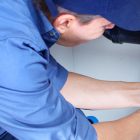Refrigerators are one of the most important appliances in any home. When they work, they keep our food fresh and our drinks cold. But what happens when they don’t? Refrigerator problems can cause a major headache, especially if you’re not sure what’s wrong or how to fix it. Thankfully, many common refrigerator problems are easy to diagnose and fix on your own. In this guide, we’ll walk you through the most common refrigerator problems and how to address them, so you can keep your food fresh and avoid expensive repair bills.
Contents
Common Refrigerator Problems
1. Refrigerator Not Cooling Properly
One of the most frequent refrigerator problems homeowners face is when their fridge stops cooling properly. This can be a huge inconvenience, especially if you have perishable items like dairy or meat. There are several reasons why your refrigerator might not be cooling as it should.
Possible Causes
- Dirty Condenser Coils: Over time, the condenser coils, which are usually located at the back or underneath the fridge, can collect dust and debris. When these coils get dirty, it becomes harder for the fridge to cool properly.
- Faulty Evaporator Fan: The evaporator fan is responsible for circulating cool air throughout the fridge. If it’s not working, the fridge may not be cooling evenly.
- Thermostat Issues: A broken or malfunctioning thermostat could also be the culprit. If the thermostat isn’t set correctly, or if it’s malfunctioning, the fridge won’t know when to turn the cooling system on or off.
How to Fix It
- Clean the Condenser Coils: Unplug your refrigerator, locate the condenser coils, and use a vacuum or brush to clean off any dirt and debris. This simple step can significantly improve the cooling efficiency.
- Check the Evaporator Fan: If the fan isn’t working, you might hear unusual noises. You can access the fan by removing the cover at the back of the freezer. If it’s not spinning, consider replacing it.
- Adjust the Thermostat: Make sure the thermostat is set between 37-40°F for the fridge and 0°F for the freezer. If adjusting the settings doesn’t fix the problem, you may need to replace the thermostat.
If you’ve tried all these fixes and your refrigerator is still not cooling, it may be time to call a professional. For help with stubborn refrigerator problems, call us at +971545356777.
2. Refrigerator Leaking Water
Water pooling under or around your refrigerator is another common problem. A leaking fridge can cause floor damage and create slippery hazards in your kitchen, so it’s important to address the issue quickly. Fortunately, the causes of a leaky refrigerator are usually easy to pinpoint and fix.
Possible Causes
- Clogged Defrost Drain: The defrost drain allows water to exit during the defrost cycle. If it becomes clogged with debris or ice, water can back up and leak out.
- Damaged Water Supply Line: For refrigerators with water dispensers or ice makers, a damaged or loose water supply line can cause leaks.
- Faulty Drain Pan: The drain pan collects excess water that’s removed during the defrost cycle. If it’s cracked or damaged, water can leak out onto the floor.
How to Fix It
- Clear the Defrost Drain: To fix a clogged defrost drain, unplug the refrigerator and locate the drain hole (usually in the back of the freezer). You can use warm water or a pipe cleaner to clear any blockages.
- Inspect the Water Supply Line: Check the water supply line for any visible damage or leaks. Tighten any loose connections and replace damaged parts as needed.
- Replace the Drain Pan: If you notice that the drain pan is cracked or damaged, replacing it is the best option to prevent future leaks.
If the issue persists or you’re unsure of how to proceed, our experienced technicians are just a call away at +971545356777.
3. Refrigerator Making Strange Noises
Refrigerators make some noise, but if you start hearing unusual or loud sounds, it could be a sign that something’s wrong. Odd noises can range from rattling and humming to buzzing and clicking, and each sound can indicate a different issue.
Possible Causes
- Loose Parts: Sometimes, simple things like loose parts or screws inside your fridge can cause rattling or vibrating sounds.
- Faulty Compressor: The compressor is the heart of your refrigerator’s cooling system. If it’s malfunctioning, you may hear a humming or buzzing noise.
- Defective Condenser Fan: A broken condenser fan can cause a loud buzzing or clicking sound, especially when the fridge is working hard to cool.
- Ice Buildup: In the freezer section, ice buildup on the evaporator fan can cause the fan blades to hit the ice, leading to a grinding or scraping sound.
How to Fix It
- Tighten Loose Parts: Unplug the fridge and inspect the inside for any loose screws or parts. Tightening them can eliminate rattling noises.
- Check the Compressor: If the compressor is making strange sounds, it might be time for a replacement. This is a more advanced repair, so it’s best to call a professional.
- Clear Ice Buildup: Defrost the freezer manually to remove any ice buildup around the evaporator fan. You can do this by unplugging the fridge and letting the ice melt.
Strange refrigerator noises can be a sign of a bigger problem. If the sound doesn’t go away or if you’re unsure how to fix it, don’t hesitate to contact us at +971545356777 for expert help.
4. Refrigerator Freezing Food
While refrigerators are designed to keep food cool, they shouldn’t be freezing it. If your fresh produce or drinks are turning into ice, something’s definitely wrong. This is another common refrigerator problems that can often be fixed with a few simple adjustments.
Possible Causes
- Incorrect Thermostat Settings: If the thermostat is set too low, it can cause your Refrigerator Problems to freeze everything inside.
- Damaged Door Gasket: The door gasket creates a seal that keeps cold air inside the fridge. If it’s damaged or worn out, cold air can escape, causing the fridge to work harder than necessary and freeze your food.
- Blocked Air Vents: Cold air needs to circulate freely through your fridge. If air vents are blocked, cold air might get trapped in one area, leading to freezing.
How to Fix It
- Adjust the Thermostat: Check the temperature settings and make sure they’re set between 37-40°F. If it’s lower than that, simply adjust it and wait a few hours to see if the issue resolves.
- Replace the Door Gasket: Inspect the door gasket for any cracks or signs of wear. If it’s damaged, you can replace it yourself or call a technician for assistance.
- Clear Air Vents: Make sure nothing is blocking the air vents inside your fridge. Rearrange items if necessary to allow for better airflow.
If these steps don’t solve the Refrigerator Problems, or if your food continues to freeze despite adjustments, call us at +971545356777 to schedule a repair.
5. Refrigerator Not Making Ice
Many modern refrigerators come equipped with built-in ice makers. When they stop producing ice, it can be frustrating, especially during the hot summer months. There are several potential causes for this common refrigerator problems.
Possible Causes
- Clogged Water Filter: If the water filter is clogged or old, it can reduce or completely stop the flow of water to the ice maker.
- Frozen Water Line: The water line that supplies the ice maker can sometimes freeze, preventing water from reaching the ice maker.
- Ice Maker Switch Turned Off: Some refrigerators have a dedicated switch for the ice maker. If it’s accidentally turned off, the ice maker won’t produce any ice.
How to Fix It
- Replace the Water Filter: Check the manufacturer’s instructions to see how often the filter should be replaced. If it’s been a while, replacing it can restore the water flow and allow ice production to resume.
- Thaw the Water Line: If you suspect the water line is frozen, unplug the refrigerator and use a hairdryer to gently thaw the line. Make sure the water line is clear before plugging the fridge back in.
- Check the Ice Maker Switch: Ensure the ice maker switch is in the “on” position. Sometimes it can get switched off accidentally.
If your ice maker still isn’t working after these fixes, or if the issue keeps coming back, give us a call at +971545356777, and we’ll send a technician to take a closer look.
Conclusion
Refrigerator problems can range from minor inconveniences to serious issues that require professional repair. Understanding the most common refrigerator problems and how to fix them can save you time and money. However, if you’re ever unsure or if the issue persists, don’t hesitate to call for help. At the first sign of trouble, contact us at +971545356777, and we’ll be happy to assist with any Refrigerator Problems repairs.
By addressing these common refrigerator problems early on, you can keep your appliance running efficiently for years to come. Remember, regular maintenance and timely repairs are key to preventing costly breakdowns and Refrigerator Problems.



